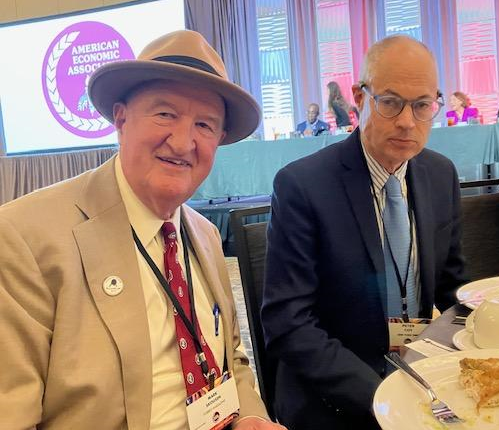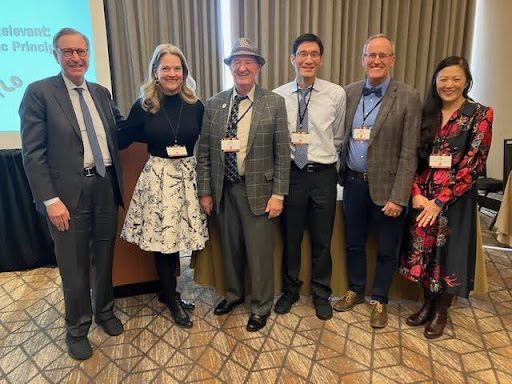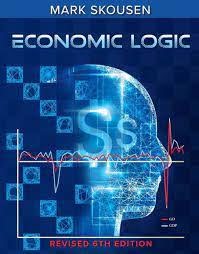The One Thing Missing from the College Classroom
Last weekend, I attended and participated in the American Economic Association (AEA) meetings in the beautiful city of San Antonio, home of the Alamo and the famed Riverwalk.
Somehow, I was able to navigate through all the sessions on gender and discrimination and found a few important meetings on the economy, which is supposed to be AEA’s mission.
I met up with Peter Coy, economics columnist for the New York Times, and we attended the same sessions on Friday about the economy, and the AEA luncheon on inflation.

Deficit Ballooned $1 trillion Since the Football Season Began
In each of these sessions, I asked this all-important question: “Given that we are at full employment, why has the Biden administration borrowed $1 Trillion since the start of the football season?”
The national debt just crossed $34 trillion: https://www.usdebtclock.org/. It was at $31.4 trillion just a year ago.
We are all taught in Econ 101 that deficits were permitted during recessions, but we should have a balanced budget and even run surpluses during full employment. Even the Keynesians oppose deficits when the economy is doing well.
I asked, “Where’s the outrage here at the AEA meetings? Have economists given up on fiscal sanity, or are they just being ignored in Washington?”
Fortunately, a few speakers did sound the alarm, such as the Conference Board’s Dana Peterson and Columbia professor Glenn Hubbard, who concluded that “the nation’s fiscal policy is not in good health.”
Harvard’s Kenneth Rogoff was ill and could not attend the AEA meetings, but has warned repeatedly that the Fed’s tight-money policy and uncontrolled spending will undermine the post-pandemic recovery. He expects interest rates to stay high.
Over the weekend, Congressional leaders agreed to a tentative $1.6 trillion budget for 2024, which is hardly what one would call fiscal sanity.
Jim Hines (University of Michigan) warned that the national debt situation is “ugly” and that Americans will see a substantial tax hike in 2025 when the Trump income tax cuts expire. He expects a Social Security crisis to hit in 2033 when the Social Security Fund runs out of money.
Education on Trial
One of the more fascinating sessions was a panel of economics professors responding to the topic, “Making Economics Relevant: Applications of Economic Principles in the Real World.”

(From left to right): Glenn Hubbard (Columbia), Tawni Hunt Ferrarini (Lindenwood), Mark Skousen (Chapman), Eric Chiang (UNLV), Dirk Mateer (Texas-Austin), and Kim Holder (West Georgia)
All the teachers on the panel were dynamic, popular academics on college campuses, and they gave some excellent examples of how to influence students to learn sound economics.
However, all five of the panelists lacked one thing: Experience in the “real world” of business! None of them had ever been CEO of a private company and had to make the hard decisions of making payroll, producing a profitable product or service, hiring and firing employees, issuing a P&L (profit and loss) statement and all the other aspects of the worldly economy.
My Decision to Go Out Into the “Real World”
At this session, I talked about this flaw in the academic world. In my own case, I started my career with three college degrees, a Bachelor’s and Master’s from Brigham Young University and a Ph.D. from George Washington University — all in economics. I was fascinated with the subject because it combined my interests in money, politics, mathematics and journalism.
In fact, looking back, I was shocked that in my entire academic career in college, I never took a class in business management, accounting or personal finance! It was all high theory and little practical advice.
Yet oddly enough, all my professors had no real-world experience running a business. They had learned their economics from the blackboard, not the corporate board.
The One Exception That Made All the Difference
There was one exception: Merrill Bateman, my econometrics teacher at BYU who had spent several years in private international business as an executive at Mars, Inc., involved in the cocoa trade in Africa. He was a consultant to Kraft Foods and General Foods, and set up his own capital management firm. He knew all about how the business worked and understood the nuances of the P&L statement, cash flow and balance sheet.
I made the decision to get real-world experience after working for the Central Intelligence Agency (CIA) in 1974. I became the managing editor of an investment newsletter, which led me to start my own publishing and mail order firm, Skousen Publishing Company; write my own newsletter, “Forecasts & Strategies,” and manage my own investment accounts; and finally produce FreedomFest, “the world’s largest gathering of free minds,” as a for-profit conference held every year in Las Vegas and other cities.
I’ve also been a consultant to major firms including IBM, Hutchinson Technology and Church & Dwight.
During my adult career, I’ve had great experiences outside academia, in government (CIA), running a non-profit organization (Foundation for Economic Education, the oldest free-market think tank) and successfully managing and owning for-profit companies.
I’ve also lectured throughout the world, having traveled to all fifty states and 78 countries. This kind of experience pays off when it comes to teaching and writing about economics, finance and business.
Writing a Real-World Textbook!
With that background, I returned to the academic world as an “adjunct” professor and have taught economics, business and finance at major colleges and universities in Florida (Rollins College), New York (Columbia Business School, Columbia University, Barnard College, Mercy College) and California (Chapman University).
Then in 2022, I was appointed the first Doti-Spogli Endowed Chair of Free Enterprise at Chapman University. Adjunct does good!
After learning the ropes of the business world and high finance, I decided to write my own “Economic Logic” textbook.

Three Ways My Economics Book is Different
Based on my “real world” experience, my textbook is very different from other academic works in three significant ways:
First, instead of the traditional approach of starting with supply and demand diagrams (which can’t be drawn in real life!), I began with the profit-and-loss income statement. I’m the only economics writer to do so.
The P&L statement does so much more than supply and demand curves to demonstrate the dynamics of the economy — why new and improved goods and services are constantly being created, why some companies flourish and others go out of business, etc.
In fact, using the P&L statement, I show that there is NO equilibrium in the economy — the quantity, quality and variety of goods and services are constantly changing.
That’s not to say supply and demand diagrams aren’t useful. They are, and I introduce them in chapter 6.
Second, I reject the standard “circular flow” diagram in favor of the “structure of production” model using a general “four-stage” model of the economy, which is more realistic of how the economy actually works.
Third, I introduce gross output (GO), the new “top line” in national income accounting, and fully integrate it with GDP as the “bottom line.” Students, especially business students, love my new approach.
As Sir John Hicks (Nobel prize economist) writes, “The concept of production as a process in time… is the typical businessman’s viewpoint, nowadays the accountant’s viewpoint, in the old days the merchant’s viewpoint.”
My textbook also benefits from my living in six countries and traveling through all 50 states and 78 countries.
How to Order ‘Economic Logic’ at a Super Discount
“Economic Logic” is THE guide to sound economics, all in one book. It’s ideal for students and adults alike and is used in introductory courses in colleges around the country. It is now in its new 6th ed. published by Capital Press/Regnery.
It is a 738-page guidebook on all aspects of sound free-market economics. It is dedicated to Milton Friedman and Friedrich Hayek. Read the book and see why.
For all the details, including chapter headings, see https://mskousen.com/economic-logic/.
The price on Amazon is $82 plus shipping, but if you order through www.skousenbooks.com, you pay only $35. I autograph each book and mail it at no extra charge anywhere in the 50 states.
What Economists Are Saying
“Eureka! Skousen has done the impossible. Students love it! I will never use another textbook again.” — Harry Veryser, University of Detroit-Mercy
“Mark Skousen is the only economist I can understand.” — Dr. Lawrence Hayek
“An excellent balance of theory and the real world that no other text has achieved.” — Charles Baird, California State University, East Bay
“Better than any book out there! Skousen presents real business economics in a clear, provocative and logical fashion.” — Ian Mackechnie, University of Wales
“Perfect for any economics student — designed to maximize learning while minimizing monotony. Simple, direct and comprehensive.” — K. Au, Homeschool instructor
“My college econ classes, filled with perplexing theories like the paradox of thrift, GDP and Keynesian fiscal policy, were completely refuted by this excellent free-market textbook. Students, if your professors don’t use this text, get it for yourself so you can really understand the concepts of sound economics.” — Amazon review
Upcoming Appearances
Orange County AAII Conference, Saturday, January 20, 2024: If you live in Southern California, please join me for my two-hour presentation on the outlook for stocks, commodities and real estate, 9-11 a.m. at the Center of Founder’s Village, 17967 Bushard Street, Fountain Valley, CA 92708. Parking is free, but there is a $5 charge for attending this event sponsored by the Orange County chapter of the American Association of Individual Investors. For more information, go to the AAII Orange County Webpage. To confirm your attendance, email Stephanie at sdavis388@gmail.com.
I’ll be autographing copies of my books at this event.
Las Vegas MoneyShow, February 21-23, Paris Resort: I’ll be giving a keynote address. Jim Woods, co-editor of my Fast Money Alert, will also be speaking. Other speakers include Steve Forbes, Nicholas Vardy (all the way from London), Keith Fitz-Gerald, Jeff Hirsch, Dave Phillips, Louis Navallier, Mike Turner and Kelly Wright.
The standard price is only $99 per person. To register, go here… or call 1-800-970-4355.
Good investing, AEIOU,
![]()
Mark Skousen
You Nailed it!
Shutting Down the ‘Old Boys Network’ in Economics
“The economics profession is awakening to a long-held secret — the gender problem in the dismal science is profound and in need of attention.” — Prof. Ann Mari May (University of Nebraska-Lincoln)
I’ve been attending AEA meetings for years, and whenever I attend the AEA luncheon, the dais is filled with Ivy League economics professors, almost all men.
That changed at this year’s AEA luncheon. Of the two dozen economists on the dais, over half were women.
Times have changed.
Women now dominate the AEA leadership, especially after Janet Yellen (the current Secretary of the Treasury) became president in 2020. Since then, three out of four presidents have been women. Several women have now won the Nobel Prize in economics.
On Friday, Jan. 5, there were two sessions on the outlook for the U.S. economy. The first was hosted by Dominick Salvatore (Fordham University) and had three men and one woman on the panel. The second was hosted by Washington Post reporter Catherine Rampell and had just the opposite mix: three women and one man on the panel. The latter session was the only one live-streamed.
All the female economists in the program gave outstanding presentations.
I do think the great progress has been made in gender equality in economics. That was clear in the report at the 2020 AEA meetings by Marianne Bertrand (University of Chicago). Read my report here: https://www.markskousen.com/

